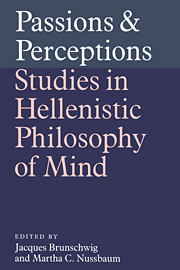Book contents
- Frontmatter
- Contents
- Preface
- Avant-propos
- Part I ETHICS AND PSYCHOLOGY OF HEDONISM
- Part II ATOMISM AND EPICUREAN PSYCHOLOGY
- Chapter 3 Epicurus on agency
- Chapter 4 Democritus and Epicurus on sensible qualities
- Part III THE PASSIONS
- Part IV STOIC PSYCHOLOGICAL CONCEPTS
- Bibliography
- Subject index
- Name index
- Index of passages cited
Chapter 3 - Epicurus on agency
Published online by Cambridge University Press: 22 September 2009
- Frontmatter
- Contents
- Preface
- Avant-propos
- Part I ETHICS AND PSYCHOLOGY OF HEDONISM
- Part II ATOMISM AND EPICUREAN PSYCHOLOGY
- Chapter 3 Epicurus on agency
- Chapter 4 Democritus and Epicurus on sensible qualities
- Part III THE PASSIONS
- Part IV STOIC PSYCHOLOGICAL CONCEPTS
- Bibliography
- Subject index
- Name index
- Index of passages cited
Summary
A great deal of attention has been paid to Epicurus' views on freedom in various contexts, and also to his metaphysical views on mind and body. In this paper I shall consider a topic which, though it is bound to be of relevance to these, is distinct from them, and cuts across them: Epicurus' account of agency.
Any study of agency in Epicurus is bound to start from the fragments of Book xxv of On Nature, the understanding of which has been so greatly improved by David Sedley. In this paper I shall be concerned with a question which to some extent cuts across the metaphysical issues of determinism and physicalism which Sedley focusses on; nevertheless, philosophical disagreements on some points will be obvious, and I should like to open with an expression of gratitude for Sedley's pioneering studies, which have done so much to bring the important concerns of this book into the centre of Epicurean research. I am also very grateful to Simon Laursen, who is preparing a new text and edition of the whole book, for very generous help on various matters. I am sure that many blunders remain, but I hope that this paper will help to encourage more work on these difficult but fascinating texts.
Although much remains puzzling about Book xxv of On Nature, some general points are clear: the book as a whole prominently included a discussion of how we are responsible for what we do.
- Type
- Chapter
- Information
- Passions and PerceptionsStudies in Hellenistic Philosophy of Mind, pp. 53 - 71Publisher: Cambridge University PressPrint publication year: 1993



